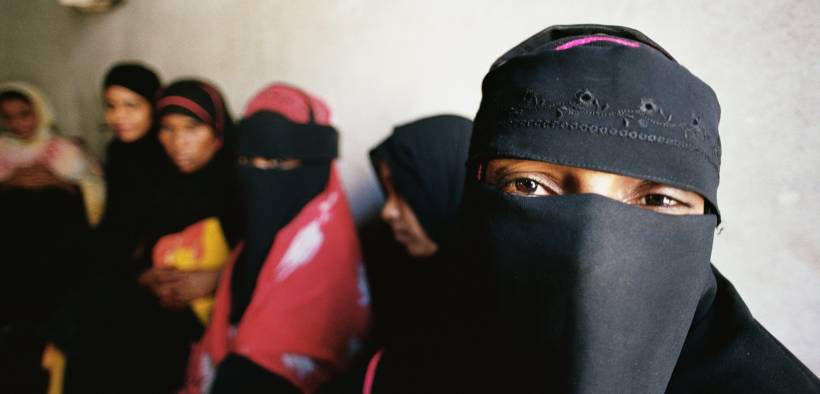Unspoken: As Gender-Based Violence Plagues Yemen, All Sides Are Guilty

In 2017 Yemen was ranked as the worst place in the world to be a woman. As the war continues to ravage the nation, Yemen women continue to suffer atrocities in silence.
Disclaimer – names have been changed for security reasons.
Nawal was not yet 16 years-old when armed militants grabbed her … what would follow would be 6 months of unspeakable abuse. Sold to one of the many militias now populating the streets of Yemen, Nawal was walking home one late afternoon when the men’s truck appeared at a street corner.
Held at gunpoint, she knew better than to struggle or scream. Made orphan by the war, Nawal was living alone with her grandmother and her younger sister Shams. A witness to the many horrors war had already brought Yemen, the teenager had seen too much of the violence such men could inflict to even a whisper of opposition. Terrified they would target her family if she fought back, Nawal barricaded herself in her silence, hoping someone would eventually take pity on her and let her go.
Eventually, her captors did … but only after they took turns to violate her.
Nawal was thrown back in the street where she was kidnapped, her young body marked by months of abuse, her mind forever shattered by the cruelty of armed groups which continues to play the verses of the Quran to justify the intolerable.
Nawal is one among thousands … yet another statistic to Yemen’s new social norm. If Yemen often takes pride in its patriarchal set-up and traditional approach of gender roles, it keeps mum to the violence women are made to endure by the hands of their self-appointed “protectors”.
Although rampant, rape is not the only abomination women in Yemen face. Slavery has become too a form of violence targeting the most vulnerable of women and children. Among the 4.3 million people displaced since late March 2015, about half of the displaced are women – 27 percent of whom are below age 18. For those poor souls, misery has become their daily bread; with little to no effort on officials’ part to somewhat remedy the situation.
In November 2017, the UN Office for the Coordination of Humanitarian Affairs (OCHA) reported that incidents of gender-based violence (GBV) including rape and sexual assault, intimate partner violence, and early and forced marriage of girls, had increased by over 63 percent since before the conflict.
More preoccupied with matters of pure politics, Yemen’s ruling elite has quite literally turned its back on its women, condemning half of its total population to violence and abuses, all that blanketed by the convenience of deniability.
When the world’s eyes are focused on drone strikes and other various military maneuvers, the fate of civilians, nevermind women, is easily lost in translation.
For all intents and purposes, the women of Yemen remain unspoken, their voices muted by those who forfeited their rights and liberties to better claim the sanctity of antiquated traditions. Yemen here is not alone … too many nations within the greater region share in their disdain of women and women’s rights in general.
While sexual and gender-based violence is widespread in emergency settings, Yemen turned a dangerous corner in the frequency and nature of such crimes – putting the war-torn nation almost on par with the horrors we have grown accustomed to hear out of Afghanistan, when the Taliban ran unchallenged.
As a report by the United Nations Population Fund (UNFPA) reads, “With limited shelter options, displaced women and girls tend to suffer most from lack of privacy, threats to safety and limited access to basic services, making them ever more vulnerable to violence and abuse. Displaced girls are more likely to lose access to schooling as families with limited resources de-prioritize their right to education.”
And, “Conflict-related loss of male breadwinners in Yemeni families adds to the economic burdens women face, especially in the case of female-headed households, 21 percent of which are headed by females under the age of 18. The pressure is even more severe where women or girls suddenly find themselves responsible for providing for their families when they themselves have been deprived of basic education or vocational training that would equip them for the labour market. In the absence of adequate empowerment and support, women and girls readily become vulnerable to negative coping strategies such as child marriage and child labour.”
A call for cooperation earlier this year (2019) at a conference gathering officials from Norway, Iraq, Somalia, the United Arab Emirates, as well as UN OCHA, UNFPA, the International Committee of the Red Cross and other partners saw renewed promises of funding to address gender-based violence in conflict-ridden nations.
While such steps are vital in further raising awareness and mobilizing aid, little will change for Yemen if those in power fail to grasp the urgency of the situation, preferring instead to battle for the reins of power. However, although bleak, the situation is not completely hopeless.
The UNFPA is currently in the process of scaling up services for survivors of gender-based violence, including through the Family Counselling and Development Foundation. As a report confirms: “Last year, two new centres opened up, providing mental health support to more than 7,000 survivors of gender-based violence, and to more than 9,000 other cases. More than 13,000 cases were handled through the nation-wide, toll-free hotline. UNFPA’s protection services for women in Yemen are supported by Canada, the European Union, Kuwait, the Netherlands, Saudi Arabia, Sweden, Switzerland and the United Arab Emirates.”
Although the war has led to a significant escalation of violence against Yemen women, it is crucial to remember that Yemen was already one of the harshest, if not the harshest, countries to live in for a woman in light of the often suffocating patriarchal mentality that has kept women in perpetual shackles.
Since 2006 Yemen has ranked last in the World Economic Forum Gender Gap Index, and in 2017 the country was listed as the worst place in the world to be a woman.
Nawal should never have had to endure the ignominy of rape for anyone of us to suddenly understand how absolutely essential peace efforts are needed in Yemen. Any delay means to condemn yet more women and yet more children to the horrors of a hell too few care to acknowledge exists.
Guilt today lies with those who choose to look away for they continue to hold that women are but commodities destined to serve men.








Every child in every country is born an ignorant savage. What is undertaken to ameliorate that condition varies greatly among countries — from virtually nothing in some countries (where gross ignorance is actively enforced), to not enough in other countries (e.g., the USA: many millions of Americans use the WWI term “over there” as a blanket category for any and all foreign countries, none of which can they find on a world map).
Regardless of governments and cultures, however, fundamental educability is a principal factor. You can send a jackass to school, but he will not come back a horse. Fifty percent of all people have below-average intelligence. If Darwin were still alive, he would have some trenchant observations centered on sexual selection, survival of the fittest, etc.
All children are born blessed with a pure intuition , the society who would mess them up with their stupid rules and modification to suit the elite to enslave . DArwin is a meesed up mentally when he classified poeple , HE IS NOT GOD to say who stay and who goes ? Society is modified in a dark and evil ways that is the real issue